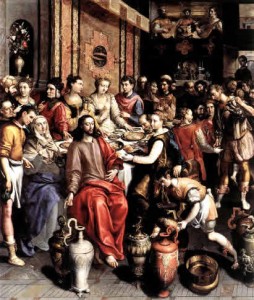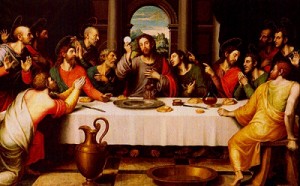RE: John 2:1-11

Wine is representative of the work of human hands because the grapes must be cultivated, harvested, crushed and contained. So when the wine runs out it is representative of the insufficiency of man’s work to provide the elements that facilitate joy and celebration. Since the wedding is a union of man and woman, who are in the likeness of God, it represents the coming together of Heaven and Earth. The question then arises, how will the celebration go on when the wine runs out, or how will the union of man and God be celebrated if man’s work is insufficient? Christ Himself must make up for our insufficiencies. Since no man’s work is sufficient on its own merit to bring him to God, God must make up the difference. How does Jesus bridge the gap? Jesus first instructs the workers to fill jars with water. And here is where every Christian journey begins, with instruction and the purifying waters of baptism. Take notice in John 2:6 that the stone water jars that are used for this miracle are intended to be used for purifying (ceremonial washing: NAB). The baptismal waters are just a beginning because the water must be turned to wine before the head waiter approves. In a sense the head waiter is like God the Father who at His son’s baptism declares, “This is my Son in whom I am well pleased.” Similarly, the head waiter approves of the wine in an extraordinary way. The wine that Christ makes is more than sufficient in both quantity and quality and the head waiter testifies that it is better than the first wine, which was already good. This refers to the first or Old Covenant which is good not because of man’s effort but because of God’s goodness. Now the New Covenant that the Father makes is greater than the first covenant because the sacrifice will not be the blood of creatures but of His own Son. In the context of a wedding celebration this covenant shows God’s plan to save the celebration of life, which is the union of man to God. This plan involves the obedience of man, our receptiveness to His instruction and our effort in carrying out that instruction no matter how insufficient our work is. We see this kind of obedience in the actions of the waiters whom Mary tells to do as Jesus says.

In this plan, Jesus leads us from one sacrament to another; from repentance through Baptism to communion through the Holy Eucharist. For now, at the beginning of Jesus’ ministry He makes the water into wine yet when His ministry culminates in the Senegal and on the Cross He will make the wine into His blood. It is through water that we come to His Body and Blood; it is through Baptism that we come to the Holy Eucharist.
© Tim Bartel 2009